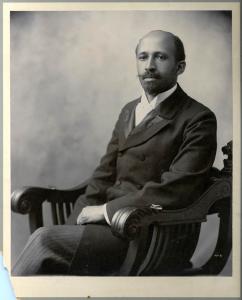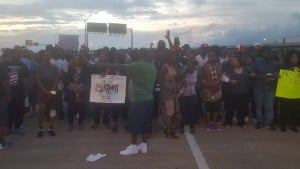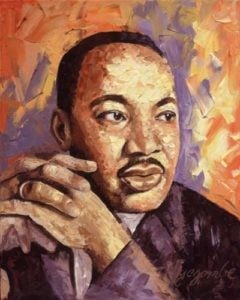 In the December 1918 issue of The Crisis magazine, W.E.B. Du Bois celebrated the end of the First World War with a loud and enthusiastic call for the right of all Americans to vote. Du Bois wrote, “Now that the war is over, we have but one word and one thought—the Ballot. We want that ballot safeguarded by every reasonable and decent limitation, impartially applied; but it can no longer be limited by race and sex (p. 62). Du Bois not only advocated for the right to vote but also called for African Americans to utilize their right to vote and participate in democracy as fully-fledged citizens of the United States of America.
In the December 1918 issue of The Crisis magazine, W.E.B. Du Bois celebrated the end of the First World War with a loud and enthusiastic call for the right of all Americans to vote. Du Bois wrote, “Now that the war is over, we have but one word and one thought—the Ballot. We want that ballot safeguarded by every reasonable and decent limitation, impartially applied; but it can no longer be limited by race and sex (p. 62). Du Bois not only advocated for the right to vote but also called for African Americans to utilize their right to vote and participate in democracy as fully-fledged citizens of the United States of America.
Almost forty years later, however, Du Bois’ attitude of voting had changed. In the October 20, 1956, issue of the Nation, Du Bois lamented,
I shall not go to the polls. I have not registered. I believe that democracy has so far disappeared in the United States that no “two evils” exist. There is but one evil party with two names, and it will be elected despite all I can do or say…. I have no advice for others in this election. Are you voting Democratic? Well and good; all I ask is why? Are you voting for Eisenhower and his smooth team of bright ghostwriters? Again, why? Will your helpless vote either way support or restore democracy to America?….Is the answer the election of 1956? I will be no party to it and that will make little difference. You will take large part and bravely march to the polls, and that also will make no difference (par. 4, 8, 10).
While many scholars have examined the life and legacy of Du Bois across disciplinary lines and using multiple methods, important aspects of Du Bois’ use of rhetoric have yet to be studied or accounted for, which is surprising given the copious amount of written and spoken material we have by Du Bois. Anyone studying Du Bois and his use of rhetoric would have to wade through an abundance of material. For example, the Du Bois corpus consists of not only speeches and essays, but also short stories, poems, novels, editorials, and sermons. While there have been volumes devoted to the writings and speeches of Du Bois, there has not been one volume devoted to an analysis of those writings. Moreover, outside of a few dissertations and conference proceedings and articles, Du Bois’ use of rhetoric has surprisingly not garnered much attention.
In addition, the few treatments of Du Bois’ rhetoric do not examine his use of religious rhetoric. Previous scholarship about Du Bois has downplayed the role of religion in his life, which has in turn influenced rhetorical studies. Biographers have argued that Du Bois was so hostile to religion that others examining Du Bois followed suit and have, thus, rarely examined him through the lens of religion. This, however, as scholars such as Zuckerman (2000) and Blum (2007) note, was far from the truth. Du Bois, far from being hostile to religion, was deeply committed to a rational understanding of religious views and though many saw his practice of religion as not ascribing to societal norms, Du Bois found comfort in his construction of religion.
His familiarity with the religious tradition led Du Bois to use prophetic rhetoric as a mode of discourse. In the May 1914 issue of The Crisis magazine, Du Bois penned a response to Rev. Charles Dole, who believed that The Crisis and Du Bois were not patient enough for change to happen regarding the civil rights of African Americans. Du Bois published Mr. Dole’s letter and, in the same issue, offered a response. Du Bois grounded his response to “Mr. Dole’s notion of gradualism” in the Hebrew prophets of the Bible. “When the Hebrew prophets cried aloud, there were respectable persons by the score who said: “Unfortunate Exaggeration, Unnecessary Feeling, and Ungodly Bitterness! Yet the jeremiads were needed to redeem a people (p. 24). In writing about the progression that many believed humanity made during this time, Du Bois reminded his friend that this progress was made possible by the
[S]oul-torn strength of those who can never sit still and silent while the disinherited and the dammed clog our gutters and gasp their lives out on our front porches. These are men who go down in the blood and dust of battle. They say ugly things to an ugly world. They spew the lukewarm fence straddlers out of their mounts, like God of old; they cry aloud and spare not; they shout from the housetops, and they make this world so damned uncomfortable with its nasty burden of evil that it tries to get the good and does get better (p. 26)
He closed his editorial by reminding Mr. Dole that with the “sainted spirits of such as these The Crisis would weakly but earnestly stand and cry in the world’s four corners of the way, and it claims no man as friend who dare not stand and cry with it” (p. 26).
By equating The Crisis and his own role as editor in the same spirit of the biblical Hebrew prophets, Du Bois saw his position as more than just an editor and writer of editorials. That is, he saw his role as editor as one divinely given to him, one that he must answer and accept. Du Bois cast himself in the role of a prophet and throughout his life, by using prophetic rhetoric and adopting prophetic personas, he reached out and attempted to persuade his audiences.
In this essay, I briefly examine the prophetic rhetoric of W.E.B. Du Bois. By examining his editorials while editor of The Crisis and other writings, I argue that Du Bois employed different types of prophetic discourse grounded primarily within the African American Prophetic Tradition (AAPT). For purposes of this essay, I specifically highlight Du Bois’ use of mission-oriented prophecy as a way to call African Americans to a divine mission of social uplift. In so doing, my aim is three-fold. First, I seek to build upon the fledgling rhetorical scholarship on Du Bois. Second, following Zuckerman and Blum, I seek to (re)introduce to readers and (re)claim Du Bois as a religious rhetor. Finally, I seek to add to the scholarship on prophetic rhetoric.
Read the rest here.
Donate to the Work of R3
Like the work we do at Rhetoric Race and Religion? Please consider helping us continue to do this work. All donations are tax-deductible through Gifts of Life Ministries/G’Life Outreach, a 501(c) (3) tax-exempt organization, and our fiscal sponsor. Any donation helps. Just click here to support our work.











